The benefits of indoor plants and how to keep them alive over the winter
People tend to like plants.
Most of us will either be a plant enjoyer to some degree or know someone who is.
According to the biophilia hypothesis, the desire to be around nature and other forms of life has, in part, a genetic basis in humans.
There are also a lot of benefits to being around plants.
It's no secret that plants, trees especially, are necessary. They filter the air and pump out the oxygen we need to live.
But most homes aren't going to be able to house a tree — good luck getting approval from the condo board or Homeowner's Association for that.
"And this is Alberta, where it's -40 C for what feels like half the year and the plants are buried under the snow," you might be thinking.
How about small potted indoor plants? Even a tiny student dorm room will have space for one or two of those.
Why would you want one, two or a dozen plants in your house?
Well, between increased relaxation and better cognitive functions, the plants might start to grow on you.
Plants and you
"Bringing live plants into your home will boost your mood and make you feel less stress and fatigue," said Anita McDonald with Kuhlmann's Greenhouse.
The 2022 study Effects of Indoor Plants on Human Functions: A Systematic Review with Meta-Analyses showed that the presence of indoor plants had a positive effect on study participants in several areas.
The study found that people exposed to indoor plants had "significantly" lower diastolic blood pressure (DBP) values.
DBP is the pressure in arteries when your heart relaxes between beats, the lower number when blood pressure is measured.
High blood pressure can cause and be related to a number of health issues.
The lower DBP levels are associated with feeling more relaxed.
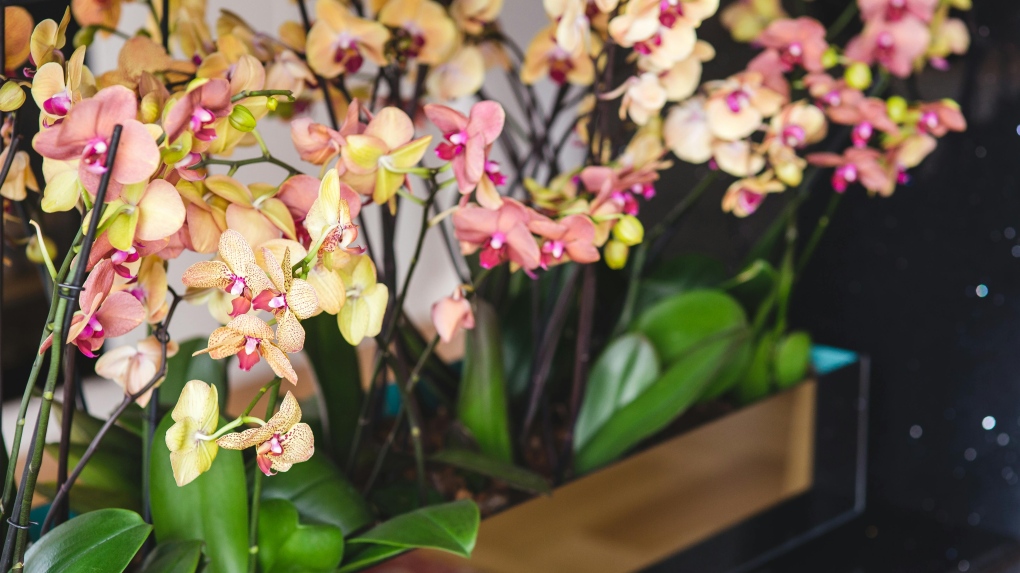 Orchids. (Pexels)
Orchids. (Pexels)
Another point in the study suggested that while participants with plants had a lower attention span, they also had quicker responses and significantly higher academic achievement.
The study did determine that more research is needed, but that "in general, people have better functions with the presence of indoor plants."
The presence of indoor greenery also has been observed to help with depression and anxiety, according to a 2020 study.
"There are many groups on social media that are totally geared to people who love plants so it can make you a part of a common community as well," McDonald said.
Cultivating the workplace
If being around indoor plants can benefit people at home, can it do the same in the workplace?
A 2023 study, Effects of indoor plants on office workers: a field study in multiple Dutch organizations, found that employees liked having plants around, but the greenery didn't have a significant impact on mood and mental well-being.
Participants were found to have expected a larger impact on their well-being than was observed.
One impact noted was a drop in complaints about the humidity levels in the office.
The study did make an effort to choose plants that would improve humidity conditions, rather than plants chosen for ornamental value.
A 2019 study, Potential of a Small Indoor Plant on the Desk for Reducing Office Workers’ Stress, found workers with small plants at their desks benefitted from them.
Overall, workers' state-trait anxiety inventory, a way of measuring current and long term anxiety levels, was observed to decrease significantly.
The study theorized that being able to pick the plant the workers would care for helped them grow attached to it and helped lower psychological stress.
Indoor air quality index
One popular argument for having indoor plants is that they improve air quality.
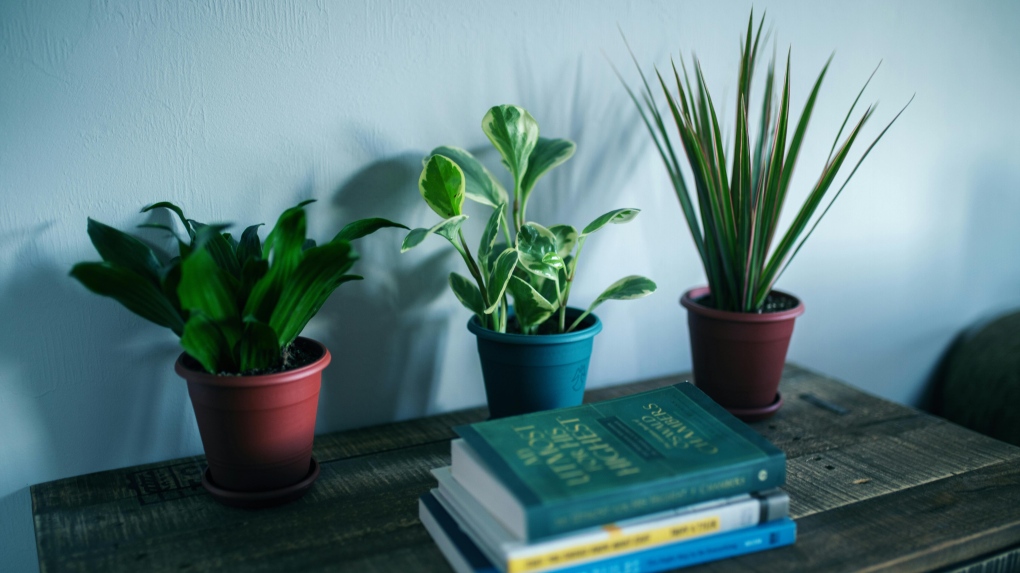 Indoor plants. (Pexels)
Indoor plants. (Pexels)
A well-known 1989 NASA study looked at if plants could be effective ways of cleaning the air, potentially with spacefaring applications.
Since then, numerous studies have been done and while most don't question that plants can help clean the air in a space, some question how effective they really are in a home environment.
A 2019 study found that a large amount of plants would be needed to have a significant effect in a home because of the size and ventilation.
Having potentially hundreds of indoor plants presents its own issues, and isn't going to be practical.
Other studies extol the virtues of plants' air-filtering capabilities.
Growing without a green thumb
"I can't keep a plant alive though!" you might be exclaiming, but not everything is as delicate and easily killed as an orchid.
Take the snake plant for example, it can regrow from its own metaphorical ashes like a plant phoenix.
"Most tropical plants are easy to take care of, (they need) less water and lower light levels," McDonald said.
Some plants can be said to thrive on neglect, though that does only go so far.
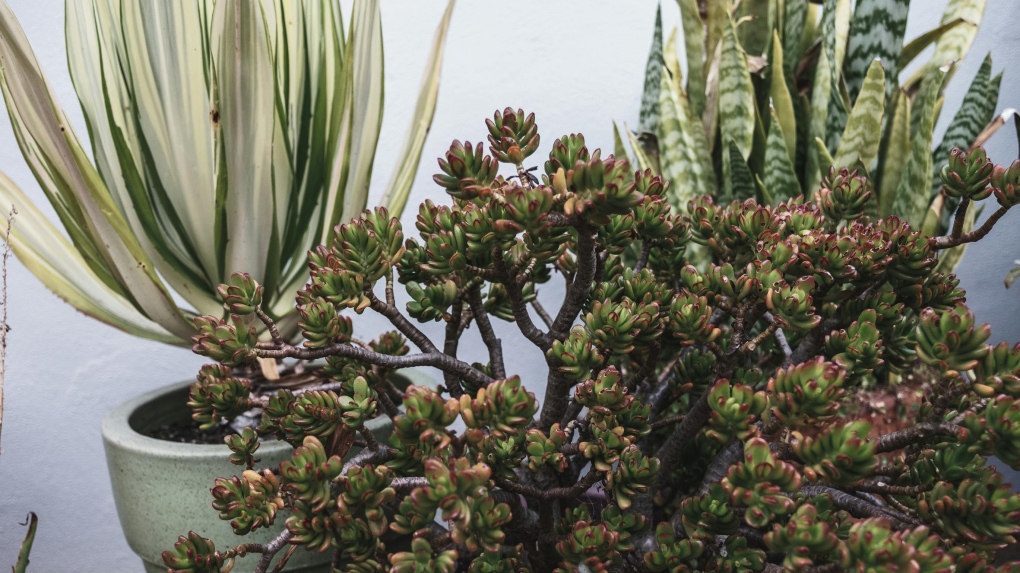 Indoor plants. (Pexels)
Indoor plants. (Pexels)
Snake, spider and jade plants are a few hardy ones that don't need much attention once they've established themselves and grown a bit.
Succulents, famously, thrive in dry, arid environments, like the Chihuahuan Desert or an Alberta household in the winter.
Forgetting to water your plants in the winter isn't always a bad thing either.
Plants need light for their metabolism to process water and with less light this time of year, it takes them longer to do that.
Each plant will be different, some might just slow down while others go dormant.
"Never let plants sit in water," McDonald said.
"Look for windows that get more light for the winter and shuffle plants to those areas."
Don't rely on the dryness of the soil's surface to figure out when it's time to water. Rob Sproule, a co-owner of Salisbury Greenhouse, advises to stick your finger into the soil and water if it's dry up to the first knuckle.
Along with the lower light levels, Alberta is known for its dry climate, which can steal moisture from people and plants alike.
Most plants, looking at you tillandsia and peace lilies, like medium-to-high humidity levels.
Having a humidifier will help with that, but you can also move plants into a well-lit bathroom or kitchen to take advantage of the running water and steam.
Beware the front and back doors. It might not seem like it, but the temperature fluctuations a plant can experience from getting a blast of cold air just from opening and closing a door in the dead of winter can be damaging or fatal.
Sproule recommends just moving the plants away from doors that are frequently used and keeping them from touching old windows, because if the glass freezes it can kill leaves.
McDonald also recommends keeping plants away from heat vents.
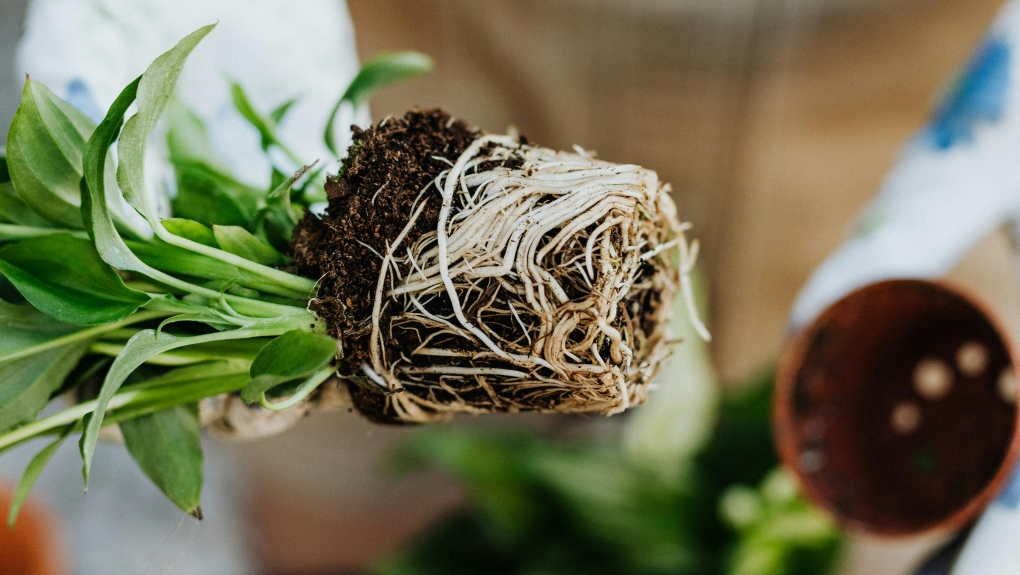 The root ball of a potted plant. (Pexels)
The root ball of a potted plant. (Pexels)
If you think a plant is dead, McDonald recommends removing the root ball from the pot and inspecting it. If it has a sour, rotten smell, the plant cannot be saved.
Wintering in the tropics (AKA inside)
Those who are more inclined to plants may have some that live outside during the summer months.
While some people may decide to let them wither over the winter and plant new ones in the spring, some can be saved and planted anew.
According to the Edmonton Horticultural Society, you can save bulbs from tender perennials like dahlia and geraniums and replant them again next year.
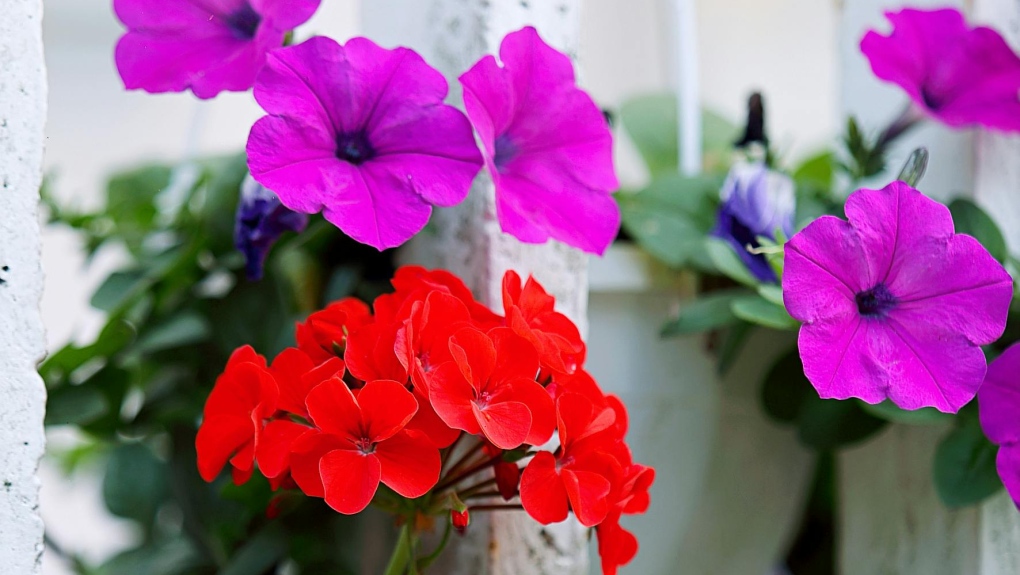 Geraniums. (Pexels)
Geraniums. (Pexels)
Other outdoor plants can be brought in and turned into houseplants, and the Calgary Horticultural Society has some tips on how to make the transition.
Something to be aware of when bringing outdoor plants indoors is the potential for insect problems to arise in the home.
Salisbury Greenhouse and the University of Minnesota have tips for debugging your now-house plants.
If you want to return the plants to their previous residence outside in the spring, McDonald says to wait until the danger of frost has passed, usually after the May long weekend or June 1.
Pets and plants
One thing to be especially aware of when getting plants is how they can affect the furry residents of your house or vice versa.
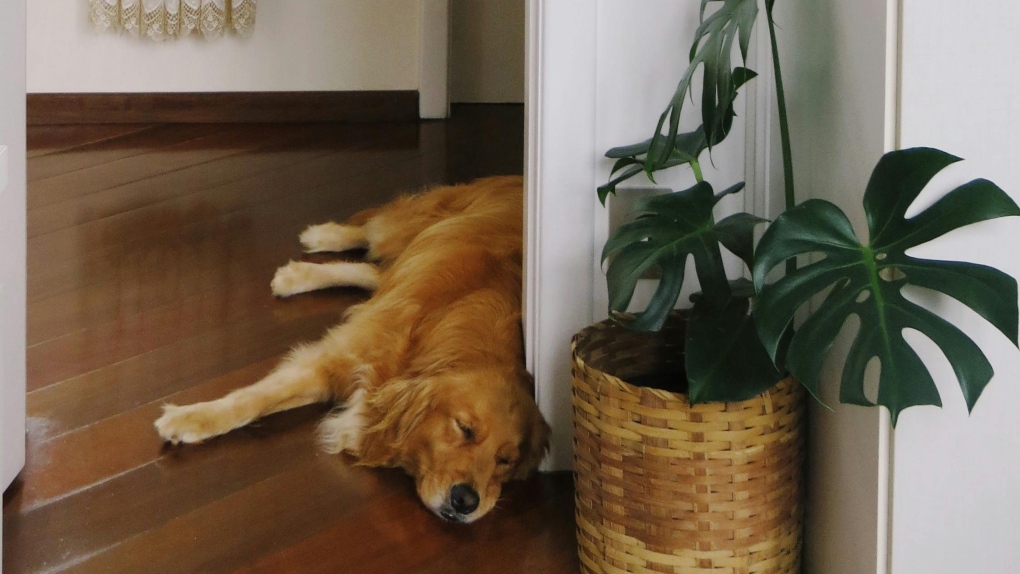 A dog and a houseplant. (Pexels)
A dog and a houseplant. (Pexels)
There are plenty of plants that can be harmful or deadly to cats, dogs and other pets.
The Alberta SPCA, the city of Calgary and the American SPCA have information about plants that can be dangerous for pets online.
Potting tips
If you're not sure if a plant is ready to move into a bigger pot, check the bottom of the pot it is currently in. If there are roots growing out of the holes at the bottom, it can be repotted, according to McDonald..
Another indication that it's time to upsize a plant is that it needs more waterings than usual.
"Remember to only increase pot size by two inches - from a four inch pot into a six inch pot size," McDonald said.
"Some plants can be divided and then remain in the same pot," she added. "When you disturb plant roots they don’t always like this and can wither.
"So be careful, it may be better to re-pot into a larger container."
CTVNews.ca Top Stories

Canadian government announces new border security plan amid Donald Trump tariff threats
The federal government has laid out a five-pillared approach to boosting border security, though it doesn't include specifics about where and how the $1.3-billion funding package earmarked in the fall economic statement will be allocated.
Fall sitting bookended by Liberal byelection losses ends with Trudeau government in tumult
The House of Commons adjourned on Tuesday, bringing an end to an unstable fall sitting that has been bookended by Liberal byelection losses. The conclusion of the fall sitting comes as Prime Minister Justin Trudeau's minority government is in turmoil.
Police chief says motive for Wisconsin school shooting was a 'combination of factors'
Investigators on Tuesday are focused on trying to determine a motive in a Wisconsin school shooting that left a teacher and a student dead and two other children in critical condition.
14 dead and hundreds injured in magnitude 7.3 quake in Vanuatu. Some people are trapped in rubble
A magnitude 7.3 earthquake that struck off Vanuatu killed at least 14 people, injured hundreds more and caused widespread damage across the South Pacific island nation, rescuers and officials said early Wednesday. Rescuers worked through the night trying to reach some people yelling under the rubble.
Prosecutors charge suspect with killing UnitedHealthcare CEO as an act of terrorism
The man accused of killing UnitedHealthcare's CEO has been charged with murder as an act of terrorism, prosecutors said Tuesday as they worked to bring him to a New York court from from a Pennsylvania jail.
'She will not be missed': Trump on Freeland's departure from cabinet
As Canadians watched a day of considerable political turmoil for Prime Minister Justin Trudeau and his government given the sudden departure of Chrystia Freeland on Monday, it appears that U.S. president-elect Donald Trump was also watching it unfold.
The world's busiest flight routes for 2024 revealed
If you think planes have got fuller and the skies busier over the past year, you’d be right — especially if you live in either Hong Kong or Taipei.
NASA's 2 stuck astronauts face more time in space with return delayed until at least late March
NASA's two stuck astronauts just got their space mission extended again. That means they won’t be back on Earth until spring, 10 months after rocketing into orbit on Boeing’s Starliner capsule.
Sex-ed group deemed 'inappropriate' by Tory government returns to N.B. schools
A sexual-education group whose presentations were deemed "clearly inappropriate" by the previous New Brunswick Progressive Conservative government has been cleared to return to the province's schools.


































